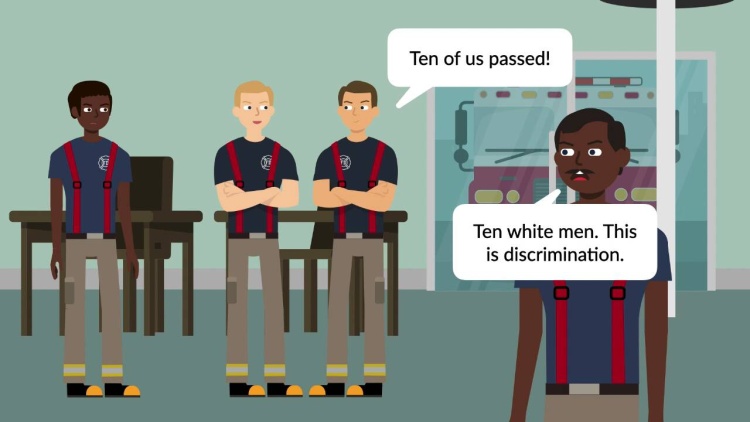Ricci v. DeStefano
United States Supreme Court
557 U.S. 557 (2009)
- Written by Angela Patrick, JD
Facts
Firefighters in New Haven, Connecticut (the city) had to take a written exam before they could be promoted to lieutenant or captain. Each open position would be filled using one of the three top-scoring candidates. The exam results would determine promotions for the next two years. Based on the exam results, the 10 candidates eligible for the current lieutenant openings were all White. For the captain exam, seven White candidates and two Hispanic candidates were eligible for the current openings. The city was concerned about legal liability. If the city used the test scores, it would be sued by the minority candidates denied promotions. Alternately, if the city did not use the test scores, it would be sued by those who would have been promoted if it had. The city decided not to use the test to make promotion decisions. White and Hispanic firefighters (plaintiffs) sued the city, arguing that they had been denied promotions in violation of Title VII of the Civil Rights Act of 1964 and the Fourteenth Amendment’s Equal Protection Clause. The district court granted summary judgment to the city, and the United States Court of Appeals for the Second Circuit affirmed. The United States Supreme Court granted certiorari.
Rule of Law
Issue
Holding and Reasoning (Kennedy, J.)
Concurrence (Alito, J.)
Concurrence (Scalia, J.)
Dissent (Ginsburg, J.)
What to do next…
Here's why 907,000 law students have relied on our case briefs:
- Written by law professors and practitioners, not other law students. 47,100 briefs, keyed to 996 casebooks. Top-notch customer support.
- The right amount of information, includes the facts, issues, rule of law, holding and reasoning, and any concurrences and dissents.
- Access in your classes, works on your mobile and tablet. Massive library of related video lessons and high quality multiple-choice questions.
- Easy to use, uniform format for every case brief. Written in plain English, not in legalese. Our briefs summarize and simplify; they don’t just repeat the court’s language.





